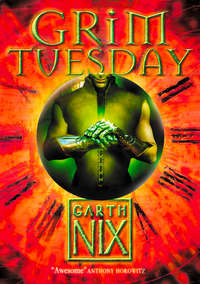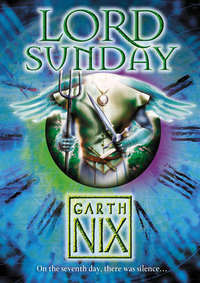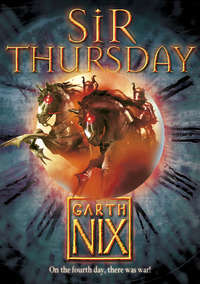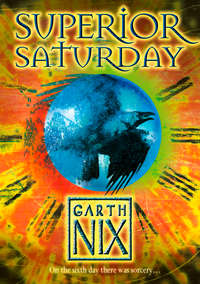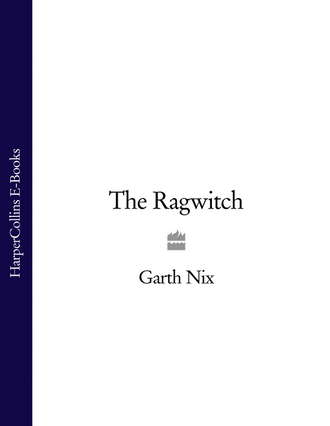
Полная версия
The Ragwitch
Paul awoke in darkness to find Aleyne crouched as his side, barely visible in the starlight. He opened his mouth, but Aleyne quickly put his hand over it, before leaning forward to whisper, “Do not speak normally. We must be quiet.”
Paul nodded. “Why?”
“There are creatures in the forest. I heard them earlier, in the distance, but now they are nearby. I think they are…dangerous and they seem to be hunting. Get up–we must leave now, before light.”
Paul nodded again and began to crawl towards his pack. Aleyne stopped him again and gestured to leave it. Taking the boy’s hand, he began to creep away, leaving his pack as well. Paul stumbled after him, still too sleepy to argue.
Several hundred metres and many scratches and bumps later, Paul felt Aleyne suddenly stop and kneel down, dragging Paul with him. Aleyne pointed to his ear and then back the way they had come. At first Paul heard nothing, then he caught a sort of snorting sound–and the jangle of metal. The old iron pot, realised Paul, probably being thrown against a tree. Whatever it was back there obviously had a bad temper.
Paul started to get up again, but Aleyne didn’t move, so he knelt back down. The snorting sounds were louder, and butterflies started in Paul’s stomach as he realised they were getting nearer. Then the snorts suddenly stopped, to be replaced by a long, high-pitched howl. With a sudden jerk, Aleyne leapt to his feet, dragging Paul with him.
“They’ve found our trail!” he shouted, careless of the noise. “Run!”
But Paul was already running, almost as Aleyne spoke. He knew this forest would turn out just as bad as the other one and had no desire to meet anything that howled like the thing behind them. Crashing through branches and stumbling over the uneven ground, Paul was unaware of Aleyne behind him, till he touched his shoulder, directing him to the right.
“This way,” shouted Aleyne. “It’s our only chance!”
“Can’t you fight them?” panted Paul, narrowly ducking an overhanging branch, a dim outline seem at the last moment.
“I don’t even know what they are,” replied Aleyne, stumbling behind him. “But if they’re what I think they are–no!”
“What do you think–ow!–they are?” asked Paul, panting for air. But Aleyne didn’t answer, only pushing him on from behind. The ground was rising steeply in front of them and the trees were becoming thicker, so Paul often had to use both hands to fend off branches. Oddly enough, the trees seemed to be in rows after a while, and the way became easier, almost like an overgrown road–though Paul was so short of breath he hardly noticed.
Then the howling began again, closer behind them, and Paul forgot about breathing. All his thoughts went into his legs, and into watching the way ahead in the dim, pre-dawn starlight. But no matter how fast he ran, the howling drew closer and closer, until Paul felt he had to look behind. A low branch chose this precise moment to get in the way of his foot and Paul went flying over into the leaf-littered ground. Aleyne checked in mid-stride and turned to face their pursuers, his pitiful dagger at the ready.
Paul quickly rolled over and looked back to see Aleyne silhouetted above him, the starlight reflecting on his blade. And there, in front of him, loomed a larger shadow, over two metres tall, with grossly overlong arms, and talons as long as knives, that seemed to crawl with shadows.
“Ornware!” shouted Aleyne, drawing his dagger across his thumb and then plunging it into the trunk of the nearest tree. “Ornware! Blood of mine, and Blood of Tree, on Ornware’s Road to Summon Thee!”
Nothing happened and their pursuer loped forward, making small grunting sounds. Aleyne stepped back before it, aware that it could kill him whenever it chose. Paul kept his eyes on the creature and started to slip back under the trees.
“Gwarulch,” whispered Aleyne, as the monster crept forward, stalking its prey.
As he spoke, the Gwarulch struck, an arm swinging across at throat level, talons extended for a killing slash. But Aleyne saw it coming. Ducking under the blow, he threw himself sideways under Paul’s tree as the Gwarulch leapt forward.
“You should have thrown the dagger at it!” shouted Paul, stumbling away as the Gwarulch burst through the branches. Aleyne didn’t answer, for the creature struck at him again–this time successfully, tearing open the front of his tunic and shallowly slicing his chest. He tried to dodge again, but the Gwarulch was too quick, backhanding him across the head. With the crack of branches, Aleyne fell to the forest floor, in front of Paul’s horrified gaze.
The Gwarulch looked at Paul with deep-set, piggy eyes–and pounced, talons extended. But Paul’s small size was to his advantage among the thick foliage; he slid between two large branches and the talons raked bark instead of flesh.
Despite this, Paul knew the Gwarulch would get him eventually. He desperately looked around for a branch or a stone, or any sort of weapon–and then he saw Aleyne’s dagger, still protruding from the tree. He leapt for it, as the Gwarulch leapt at him.
Paul’s hand fastened around the hilt and he half-turned, to draw and throw it, as the Gwarulch emerged from under the tree. Out of the tree-shadow, it was a hideous sight. Vaguely ape-like, its upper jaw protruded to show ripping fangs, and its eyes were piggy and lit with an evil intelligence. It eyed Paul with something like amusement and licked its lips in a very human gesture.
Paul vainly tugged at the dagger as the Gwarulch advanced, still licking its lips with a bluish, forked tongue. It reached out a taloned hand and, gripping Paul’s hand in its own, pulled the dagger out of the tree.
With his free hand, Paul punched the Gwarulch in the stomach, almost breaking his fingers on the thick, leathery flesh. It hurt him so much, he thought it couldn’t possibly have harmed the huge creature–when it gave a surprised sort of yelp and sank to its knees. Dragged down with it, Paul looked into its fading eyes as it toppled over, letting go of his hand.
Then he saw what had really killed it. A wooden spearshaft projected from its back, a thick spear of dark wood, engraved with runes that seemed to dance along its length.
In between the trees, Paul saw another silhouette. Instinctively, he knew it was the thrower of the wooden spear. Although man-like, the figure’s head seemed strange and Paul had to look twice before he saw that the man, if man it was, had a full set of antlers.
“Who calls Ornware?” said the antlered man. “When Gwarulch walk among his trees?”
Paul gulped and tried to sit up. Aleyne had called out to Ornware, but Aleyne was lying over by a tree, unconscious, if not…dead.
“We did,” he whispered, not daring to look up. Dawn was closer now, and the first cast of light was just allowing real shadows to creep out from the pale, star-lit imitations. And the shadows that lay across Paul were of antlers.
Paul heard an amused snuffle above him and risked a glance upwards. The antlered creature was still there, but it had moved closer to the dead Gwarulch and was pulling out the spear. It came out easily enough, surprising Paul–the spear had almost gone through the other side, and he knew no normal man could have removed it. But then normal men didn’t have antlers.
The creature twirled the spear, then approached Paul, driving the butt of the spear into the ground near the boy’s feet. Paul looked up–straight at that antlered head, meeting the creature’s eyes: deep yellow eyes, the colour of daisies, with thin, bar-like pupils of darkest green. They held power, those eyes, and violence lay beneath the placid daisy-yellow.
“I am Ornware,” said the eyes to Paul, communicating a sense of power, like the overhanging branches of a huge oak. “I am Ornware of Ornware’s Wood, as the trees are Ornware, the earth, the birds, the animals. All are Ornware.”
“Aleyne called you,” said Paul, his voice quavering, eyes still locked into Ornware’s–lost in those deep yellow pools.
Then a few hundred metres away, a Gwarulch howled–their tracking sound. Paul flinched and blinked, breaking his gaze away from Ornware’s.
Ornware’s antlered head turned to face the direction of the howling, and he twirled the spear again, bringing the bloodied point close to his mouth. Paul watched, horrified, as a wide, crimson-red tongue lashed out, cleansing the point with one swift motion. then Ornware was gone, leaping into the trees like a stag towards the approaching Gwarulch.
“The Gwarulch will bother us no more today,” said a cracked voice behind Paul. Aleyne was sitting up, fingering his head. His unruly hair was caked in drying blood. “But I am glad Ornware has other foe to hunt, else he might have turned against us.”
“But I thought you called him?” asked Paul, going over to help Aleyne up.
“You may call him,” replied Aleyne, looking back down the path, “but only in dire need. Ornware is the walking dream of the forest, only woken at its need, or by a call such as mine. But he is a dream of the forest’s fear and anger, and knows little more than blood. Worse, being a creature of raw passions, he likes nothing but the hunt and the kill. He is like a summer storm that saves you by dousing a fire, only to strike with lightning moments later.”
A howl farther in the distance punctuated Aleyne’s words, and he answered Paul’s unspoken question with a finger drawn across his throat. Obviously, the rune-carved spear had found another Gwarulch heart.
“Come on,” said Aleyne, leaning on Paul. “There should be a stream on the other side of this hill, where I can wash these cuts, and try to get us halfway clean for Rhysamarn and its Wise Men. With such an early start, we should be there by mid-afternoon.”
The Gwarulch had not been idle in reaching as far south as Ornware’s Wood so soon after the Ragwitch’s ordering Her war. While the settled folk to the south were unaware of it, the Gwarulch had long lived near, or even within, the northern border, and the Meepers had been quick to fly to isolated bands with orders to waylay travellers and other isolated folk.
Julia had not been idle either. When the Ragwitch was busy, she found it was possible to wrench her mind away. When she did this, she only ended up back “inside” the Ragwitch, near the globe, but at least she got her own body back–despite the Ragwitch’s past assurances that Julia would never feel her own body again. The Ragwitch even seemed amused by her efforts to escape and never punished the girl–apart from forcing her mind back to attach itself to the Ragwitch’s senses.
“What lies between us and the Old Border, Oroch?” asked the Ragwitch, as Her lieutenant alighted from the back of a large, leather-winged Meeper. She had taken up residence (if you could call it that, for She never slept) at the base of the Spire, where She received the reports of the Meepers and gave orders to Her army.
“A new town, Mistress,” replied Oroch, in his mewing, high-pitched tone. “Bevallan, they call it. A small place, without walls or castle. Only a tower, and that is of no great size. They have discovered peace in Your absence, Mistress.”
“It will not be a discovery they enjoy much longer,” spat the Ragwitch. “But what of their Magic: their famous Magi, all cluttered up with Staves and Rings and Talismans; those Wizards, whose flesh is foul and blood rancid?”
“None, Mistress,” chuckled Oroch, bandages whipping in the breeze as he laughed. “The Art is forgotten, as You were…” He stopped in mid-sentence, dropping to his knees as the Ragwitch towered above him to encircle his puny, bandaged neck with one of Her hands.
“Forgotten?” hissed the Ragwitch, spit bubbling between the rows of Her needle-teeth. “Then I shall remind them, will I not, Oroch, My Architect? I shall remind them, and Myself remember the sweetness of their flesh.”
Behind Her, the stone shapes of the Angarling boomed, feeling their Mistress’ anger. The Gwarulch moved about uneasily, careful to avoid the rocking, moving Angarling as they drew closer to the Spire. The Meepers, high above, twirled and dived about the Spire, revelling in the prospect of bloodshed.
Watching through the Ragwitch’s eyes, Julia shuddered and once again started to do sums in her head. Even the thirteen times tables was preferable to the Ragwitch’s memories, presented to Julia as they were with every nuance of sight, hearing, feeling…and taste.
“Assemble the Gwarulch chieftains and the Old Meeper,” the Ragwitch instructed Oroch. “I will…talk…to the Angarling.”
Julia breathed a mental sigh of relief as the memories of pillage and feasting faded, to be replaced by a strong memory of the Angarling, still as stone, being woken by a young, human Witch on her first small steps to power…Surely not the Ragwitch, thought Julia, as she felt her host clumsily lumbering towards the Angarling, those straw-stuffed legs straight and never bending, the puffy three-fingered hand outstretched to caress Her oldest allies–the Stone Knights of Drowned Angarling.
“Tomorrow,” She said, touching the white stone of the nearest Angarling, caressing the lines of the frozen face. “Tomorrow shall be death and ruin, and the sun will sink all bloody in a sky as red as fire.”
“The sun is high, my stomach grumbles and I think it’s lunchtime,” said Aleyne, pausing to let Paul catch up to him. They were climbing up a hill again, where the forest grew less thickly, but Paul was always slow uphill.
“I also think Rhysamarn is only a little way away, and at its foot there is the Ascendant’s Inn. And since…”
“We lost our packs,” interrupted Paul, “we might as well go on because there’s nothing for lunch anyway.”
“Exactly,” smiled Aleyne, who hadn’t missed Paul’s bad temper or the slight quiver of his lower lip. “How are your feet?”
“Sore,” grumbled Paul, who was now well over the night’s dangers and more concerned with his various discomforts. Trust Julia to get kidnapped to a place without buses, he thought sourly as Aleyne set off again, trying to pick the easiest way up the hill. And every “adventure” I have is always without food, and in forests full of prickles and thorns…
Paul was still thinking about thistles, because they were the most immediate nuisance, when Aleyne suddenly stopped ahead of him. Paul looked up from the ground and saw that the trees no longer rose up to the sky, and only a few metres further on lay the top of the hill–the real top, and not just another tantalisingly close ridge.
“Well,” said Aleyne, “we’re there–or near enough.” Paul rushed up the last few metres, on to the flat rock where Aleyne gazed to the east. They were truly on top of the hill, for below them the forest thinned out to nothing, to be replaced by green fields which stretched down to a narrow river spanned by a wooden bridge.
On the other side of the river, the land stretched up again, turning from lush farmland to yellow heather, which grew up and up along the slopes of a mountain that disappeared into mist.
“Rhysamarn,” said Aleyne, in a sort of deep, polite tone. Just like he was talking about a church, thought Paul, who was busy looking for the inn. Then he saw it–a large yellow house, with several red-brick chimneys, the whole place nestled in the folds of the heather, just a little way up the Mountain of the Wise.
“Let’s go,” said Aleyne, looking back from the mountain to see the boy several metres below him. Aleyne noted with amusement that Paul was not slow going down hills–at least those with the prospect of food and shelter at the end. But then neither was Sir Aleyne, sometime Knight and watcher of events on the River Awgaer.
5. Rhysamarn / The Mountain of the Wise
THREE DAYS LATER, Paul was looking down on the Ascendant’s Inn again, but this time he was standing amidst luxuriant yellow heather, headed for the secret heights of Rhysamarn. And this time he was alone.
The Ascendant’s Inn had provided a very welcome rest. The innkeeper, Master Aran, had welcomed them with foaming pints of a heady beer, of which half a pint was sufficient to stun Paul. Then they enjoyed three days of idling around the fire, fishing in the river Rhysamarn, and best of all, sleeping on the goose-feather beds under heavy eiderdowns.
Then, on the morning of the fourth day, Master Aran had said that Paul should go up–alone. How he knew, he didn’t say, but Aleyne said that this was the normal practice, and Paul must go if Aran said so.
It’s all very well for him, thought Paul crossly, looking down at the distant figure of Aleyne standing outside the inn. He doesn’t have to struggle up this mountain where it’s all cold and damp.
It was cold and damp, but to tell the truth Paul hadn’t really been bothered by it. Aleyne had bought him good woollen clothes from Aran, and roughly cut them down to size. With a sheepskin coat, soft doeskin boots and a broad-brimmed hat, Paul didn’t feel the cold at all.
All I need is a sword, thought Paul, or a short-sword anyway. He practised a few film-style lunges and slashes, and thought swashbuckling thoughts, till it occurred to him that he might really need a sword–and if he were attacked by things like the Gwarulch it wouldn’t make much difference anyway.
“Just let me find Julia,” he whispered up at the mountain. “And get us back to where it’s safe.”
Suddenly, the mountain looked less of an obstacle, compared to the problems he might have to overcome to get home–the Ragwitch and all her powers, for one. Setting his hat firmly on his small head Paul set off, up into the mist that shrouded the Mountain of the Wise.
There was a sort of path up through the heather, which wound its way between the large rocky outcrops that occasionally loomed up out of the mist. Paul took care to follow the path–the mist had become much thicker and he knew that getting lost here would mean certain death, as no rescue teams or helicopters would be around to find him.
The mountain grew steeper, and the rocky parts more numerous, and Paul was forced to use his hands to scramble up. The path became less distinct among the rocks, and he had to stop and look for it several times. Hours passed in this stop-start way and Paul began to feel less confident. Suddenly, climbing a mountain all by himself seemed incredibly stupid. He wouldn’t have done it at home, after all. And looking for “the Wise” didn’t seem very sensible – he didn’t even know what they looked like!
Aleyne had said to keep to the path and not to stop for too long, thought Paul. He started up the mountain again, then he suddenly remembered Aleyne first telling him about the Wise and his journey up the mountain. Aleyne had said “I rode my horse”–but the path was too steep and narrow for a horse.
I must have gone the wrong way! thought Paul, angry at all his wasted climbing. He thought of all that effort and considered going on. But it was obviously the wrong path…
“Down it is,” said Paul aloud, turning back down the path. But even as he took the first, easy, downhill steps, the path seemed to fade away, melting into the yellow heather or the green-grey mottled stone.
He took a few more steps, but the path disappeared, leaving no sign of its prior existence. He quickly looked around and the path uphill was going too–though it was contracting, racing up the hill, rather than fading.
With a strangled yelp, Paul jumped after it, taking great bounding steps up the slope. The heather brushed against his legs as he crashed through it, chasing the path that retreated just a little faster than he could run.
Then, without warning, both the path and the boy burst out of the mist into yellow sunlight. The path suddenly stopped and Paul jumped on it, taking great satisfaction in seeing his boot-prints on the open dirt. He took a few steps along it, to give himself a head start in case it started to race away again, and looked around.
Downhill, a thick wall of mist obscured any view, but uphill, the sun was shining, its warmth already touching Paul’s mist-wet clothes and face. A little further along, the heather started to fall back, and above this border of heather loomed the grey shale peak that was the top of Rhysamarn.
But it was what lay in between that attracted Paul’s attention. Just above the heather, but before the grey stone, lay a field of dark brown earth. It was larger than a suburban garden, but not really a decent market garden size. And in the middle of it, an old man was planting something that looked very like cabbages.
Hesitantly, Paul walked over to the field. Aleyne had told him that the Wise appeared in different guises, but he hadn’t expected an old man planting (or transplanting) baby cabbages.
“Hello,” said Paul, upon reaching the edge of the field. “I’m Paul. I’m looking for the Wise.”
The old man looked up from the cabbages, revealing a lined face, rosy cheeks and a reddish nose. His white hair and moustache threatened to weave a mask around his face, but he parted the long locks with a dirty hand. The bright eyes that looked at Paul were in no way obscured or dimmed by his bushy, walrus-like eyebrows, which quivered as he spoke.
“The Wise, eh? Well, you’ve come to the right place. Rhysamarn–the Mountain of the Wise. Or literally, Place of Wisdom Mountain.”
“Yes,” said Paul doubtfully. This wasn’t the reception he’d been expecting, particularly since the old man hadn’t stopped transplanting cabbages. He had hundreds of them, it seemed, in a wooden box that he dragged along between the rows.
“Well, come and help, boy,” snapped the old man. “Part of being wise is knowing the value of things. And advice got for nothing is often worthless. In your case, I would say you need counselling to the value of…about eighty transplanted cabbages.”
“Uh,” said Paul, who’d avoided even doing the weeding in his father’s garden. But he knelt down next to the box of cabbages and asked, “What do I do?”
The old man told him, demonstrating how to make a suitable hole, with a clenched fist pushed into the soil and twisted several times. Paul soon learnt the knack of it, but even so he lagged behind the old man. Closer to, this potential sage looked even more unsuitable for the role of one of the Wise. He was dressed in a simple robe of what looked like sackcloth, and wore wooden sandals that clattered as he crawled forward on his knees. And having been in the cabbage field all day, he was covered in dirt.
The sun rose higher above the cabbage planters and then began its slow decline into the west. As the shadows lengthened, Paul kept looking at the old man, hoping that he was about to call it quits. The cabbage planting business had seemed easy enough at first, but it soon became tiring and his back was stiff from being bent over all day.
Failing the signal to stop work, Paul would have welcomed some conversation, or at least some questions regarding why he was there. But the old man was silent as he planted the cabbages with a monotonous regularity; left fist in to make the hole, right hand to pick up the cabbage and place it carefully, left hand to smooth the dirt around it. Over and over again.
Eventually, the sun sank low enough to send the distant clouds red and Paul had had enough. He stuffed his current cabbage in the hole, smoothed it over and stood up, his back creaking. “I’ve had enough,” he said, a trace of self-righteousness creeping into his voice. “I’ve been planting cabbages nearly all day–a lot more than eighty cabbages!”
“One hundred and thirty-two, by my count,” said the old man cheerfully. “I was wondering when you’d realise.” He got up, straightening his back with the help of both hands thrust against his backbone. “Well, I suppose for that number of cabbages, I can give you supper as well.”
The old man bent down again and pulled a thick, oilcloth covering over the box with the remaining cabbages.
“What do I call you then?” he asked Paul. “Boy? Cabbage-planter?”
“My name is Paul,” said Paul. “What shall I call you?”
“Old Man?” suggested the sage, rolling it off his tongue as if to see how it sounded. “Cabbage-planter? Tanboule? Tanboule is the name of my house–so you may call me that. Tanboule the house and Tanboule the old man. And one shall go to the other for a supper of cabbage and bacon, bread and tea. Eh, Paul?”


